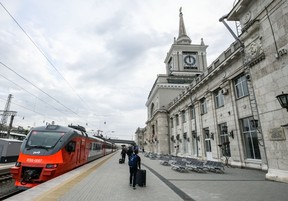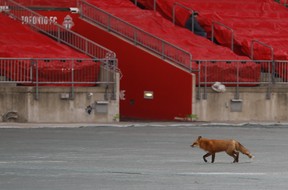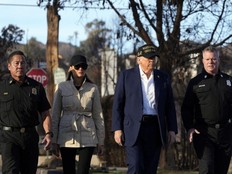'STEP BACKWARDS': World Cup will have 'ravine strategy,' but not free transit
While Toronto’s environmental plan focuses on things like diversity and animal rights, the city will fall short of FIFA’s recent standards by scrapping free rides for soccer ticket holders.

Article content
It’s not easy being green.
A not-yet-released City of Toronto environmental plan, mandated by FIFA and received by the Toronto Sun after a freedom-of-information request, shows the soccer federation and the municipal government will use an array of topics, including several tied to diversity and labour matters, to sell the soccer celebration as being as earth-friendly as it can be.
That comes despite the tournament taking “a huge step backwards” by not offering free transit for ticket holders.
In a brief statement, Sharon Bollenbach, executive director of the city’s World Cup secretariat, confirmed the Sun has the most recent edition of the environmental document, Version 5, dated September 2024. Updates to the plan and “other components of the city’s legacy framework” should be released late this year or early in 2026, she said.
“The current plan is for accredited volunteers to receive complimentary transit access during the tournament,” Bollenbach added.
A TTC spokesperson confirmed to the Sun that World Cup host cities are required to offer free transit for volunteers, but said no other fare concessions are currently in the plans.
Just last year, news reports said World Cup ticket holders would get free access to the TTC.
Included in the freedom-of-information disclosure were notes from a January 2024 meeting that was attended by two city bureaucrats and representatives from FIFA and Maple Leaf Sports and Entertainment, which operates BMO Field.
Some World Cup host requirements have “been relaxed and refined,” and “free public transportation (is) no longer” a must, the notes say.
However, “since 2014, free transit has been offered for all ticket holders, so not offering this would be a huge step backwards in 2026,” the notes add.
Notably, at the 2018 tournament in Russia, ticket holders enjoyed not just complimentary local transportation, but also free train rides between World Cup host cities.

A section of the environmental plan, headlined “low carbon transportation,” says one of Toronto’s objectives is to “enhance active and public transportation accessibility and efficiency” for the tournament. It says other “potential initiatives” are being considered, such as free parking at TTC lots, increased service from GO Transit stations, and more bike racks and bike share stations at BMO Field.
Free transit wasn’t the only thing that was dropped. Later versions of the environmental plan omit a section that references what is required by FIFA, such as “The City of Toronto shall inform what recycling and composting services for waste will be provided at all tournament sites.”
“I have consulted our legal team … our position is to ask you to remove mention of the requirements as these are taken from documents that are not in the public realm,” Paula Gabriela Freitas, a FIFA sustainability manager, wrote three city officials in an email in June 2024.
Toronto’s plan covers numerous topics, but only briefly and in very general terms. The most recent version of the plan is just 28 pages.
Topics range from the energy efficiency of the new Centennial Park training facility — which is being built for the tournament — to electric vehicles, food waste, air quality and animal rights.
At the January 2024 meeting, it was suggested the plan’s authors “consider adding procedures to deal with stray animals (such as) raccoons, squirrels” at BMO Field. That idea does not appear to have made the cut — instead, the “biodiversity and animal rights” section covers “urban bird safety and reduced light pollution,” a “pollinator protection strategy” and the “Toronto ravine strategy.”
On water management, the plan says the city will, through signs, social media and advertising, “raise awareness and educate” at the World Cup about what shouldn’t get flushed down the drain. The city is also working to “naturalize around 600 metres” of a stream in Centennial Park.

A large portion of the plan, under the headline “sustainable procurement and supply chain management,” has little apparent link to the environment. One section discusses “supply chain diversity” — encouraging access to procurement processes based on race.
Other subheadings include “fair wage bylaw,” “gender diversity in city procurements,” “workforce development” and “purchase of products manufactured in factories where children are used as slave labour or other exploitive circumstances which impede child development.”
The gender diversity portion reads, in full: “As part of city council’s support to enhance gender diversity on boards of corporations, all corporations conducting business with the City of Toronto are encouraged to utilize an intersectional analysis to strive to have gender parity on their corporate boards.”
The January 2024 meeting emphasized a need to “make a connection” with First Nations as part of Toronto’s “environmental justice” strategy. In the preliminary version of the environmental plan, there is an “environmental justice” section — but it is blank, and the section was dropped from later editions.
The documents don’t say the equity focus is mandated by FIFA, but it fits with city hall’s goals for the tournament, as previously reported by the Sun. The city set aside $7.5 million for “legacy” social initiatives, such as workforce development, for “equity-deserving communities.”
That money is part of city hall’s $380-million World Cup budget. When council committed to Toronto’s bid in April 2022, the city had pegged the cost at $290 million.
That total budget figure may not be final, as city hall committees heard this spring about a “funding gap” that could see World Cup planners “reduce scope.”
The drafting of the environmental plan will have taken years, with the first version dated October 2023. Since then, there have been meetings and many emails, one of which hints at some of the friction that process may have created.
“Understandably, some of you may not be so happy with the final results,” FIFA’s Freitas wrote in February 2024, as she gave city bureaucrats a brief extension on the environmental plan’s second version.
Toronto will host six World Cup games, with the first set for June 12, 2026.














Postmedia is committed to maintaining a lively but civil forum for discussion. Please keep comments relevant and respectful. Comments may take up to an hour to appear on the site. You will receive an email if there is a reply to your comment, an update to a thread you follow or if a user you follow comments. Visit our Community Guidelines for more information.